Learning Links for June 2017
/What we focus on is what we get. And for educators, that means the ubiquitous narrative of low test scores, broken budgets, and poor morale is unlikely to inspire positive action. At Thriving Schools, however, we’ve adjusted our lens – we simply focus on all the positives (and how all the amazing individuals behind the scenes are making them happen)! To that end, we’ve decided to start a monthly post that shares some of the articles, stories, and links that we receive (and read) each month that were published on other sites. Below is our list for June 2017 – we hope you find a couple nuggets of inspiration and intrigue!
Three Myths About Reading Levels (PsychologyToday.com)
What you’ll learn: The ubiquity and precision with which various reading level scores are now being used and reported has increasingly led to their inappropriate use. This article covers the 3 most common myths about reading levels.
Quote: “Because reading levels are often reported very precisely, one might think that measuring the readability of a text was an exact, agreed upon science. Nothing could be further from the truth.”
These Great Teachers Only Spend Half Their Time Teaching (Medium.com)
What you’ll learn: After 5 Fishman Prize winners crunched their time-tracking data, they found that they were teaching less than 50% of the time. This article discusses what takes up the rest of that time.
Quote: “So much more goes on behind the scenes that is just as important – if not more important – than instruction.”
On The Wildness Of Children: The Revolution Will Not Take Place In The Classroom (FilmsForAction.org)
What you’ll learn: How we’ve forgotten what the purpose of the factory-like educational system that we have is and how we might help children return to a more natural state.
Quote: “Our schools are, in a sense, factories, in which the raw materials – children – are to be shaped and fashioned into products… The specifications for manufacturing come from the demands of 20th century civilization, and it is the business of the school to build its pupils according to the specifications laid down.”
The One Process That Marks The Difference Between Quick Learners and Ordinary Learners (Lifehack.org)
What you’ll learn: This article is a great review of how much we learn by using various learning styles and techniques and suggests several ways in which we can learn smarter and faster.
Quote: “You must learn a new way to think before you can master a new way to be.”
Confirmation Bias: Why You Should Seek Out Disconfirming Evidence (FarnamStreetBlog.com)
What you’ll learn: We fall into the trap of confirmation bias both in our personal and professional lives. This piece focuses on understanding the bias and a few tricks to overcome it.
Quote: “What the human being is best at doing is interpreting all new information so that their prior conclusions remain intact.”

